

The Total Guide to Keyword Research - Find Your Online Gold Mine. What Are Keywords?

Keywords are words or phrases which people use to search for products, services or information online. By understanding what phrases are popular and searched for often, you can optimise your site to target those exact phrases. Within any industry, different phrases for essentially the same thing will have dramatically different search volumes. For example, 1,900 people search for the term “dance classes London” every month, which makes it much more popular than the term “dance workshops London”, which only gets 70 searches a month.
By knowing that far more people are searching for “classes” rather than “workshops”, you can optimise your website for the more popular search term, therefore hopefully putting yourself in front of more potential customers. However, there is much more to keywords than just identifying a popular search term. This is where long tail keywords come in. How to Use Google Keyword Planner 1. 1. 2. 3. 4. 5. Understanding SEO: Content + Links = SEO - Introduction Chapter 2: The Importance of Keywords Content + Links = SEO More than 200 factors are said to contribute to a page’s ranking in search engines, but we can reduce the complex to the simple by focusing on the important.
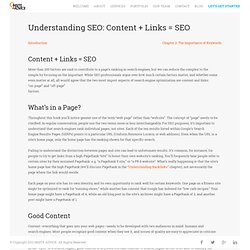
While SEO professionals argue over how much certain factors matter, and whether some even matter at all, all would agree that the two most import aspects of search engine optimization are content and links: “on-page” and “off-page” factors. What’s in a Page? Throughout this book you’ll notice greater use of the term “web page” rather than “website”. Failing to understand the distinction between pages and site can lead to unfortunate results. Search engine optimisation - A Practical Guide to Web App Success. Chapter 23 Newly launched web apps tend not to have a special backstory to generate natural excitement, or piles of spare cash to splurge on marketing.
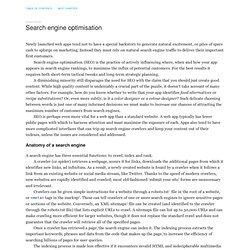
Instead they must rely on natural search engine traffic to deliver their important first customers. Search engine optimisation (SEO) is the practice of actively influencing where, when and how your app appears in search engine rankings, to maximise the influx of potential customers. For the best results it requires both short-term tactical tweaks and long-term strategic planning. A diminishing minority still disparages the need for SEO with the claim that you should just create good content.
SEO is perhaps even more vital for a web app than a standard website. Anatomy of a search engine A search engine has three essential functions: to crawl, index and rank. A crawler (or spider) retrieves a webpage, scours it for links, downloads the additional pages from which it identifies new links, ad infinitum. How To Do Keyword Research - The Beginners Guide to SEO - Moz. It all begins with words typed into a search box.

Keyword research is one of the most important, valuable, and high return activities in the search marketing field. Ranking for the right keywords can make or break your website. By researching your market's keyword demand, you can not only learn which terms and phrases to target with SEO, but also learn more about your customers as a whole. It's not always about getting visitors to your site, but about getting the right kind of visitors.
The usefulness of this intelligence cannot be overstated; with keyword research you can predict shifts in demand, respond to changing market conditions, and produce the products, services, and content that web searchers are actively seeking. How to Identify Long-Tail Keywords for Your SEO Campaign. The Case for the Long-Tail A lot has been written about the importance of long-tail keywords for SEO campaigns.
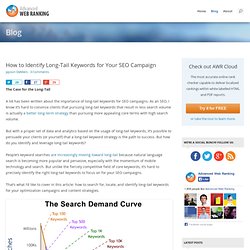
As an SEO, I know it’s hard to convince clients that pursuing long-tail keywords that result in less search volume is actually a better long-term strategy than pursuing more appealing core terms with high search volume. But with a proper set of data and analytics based on the usage of long-tail keywords, it’s possible to persuade your clients (or yourself) that a long-tail keyword strategy is the path to success. But how do you identify and leverage long-tail keywords? People’s keyword searches are increasingly moving toward long-tail because natural language search is becoming more popular and pervasive, especially with the momentum of mobile technology and search.
Keyword Targeting - How to gain page rank with keyword selection. How to gain page rank with keyword selection.
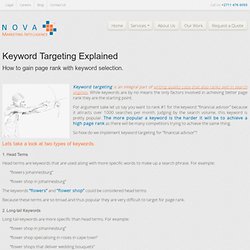
Keyword targeting is an integral part of writing quality copy that also ranks well in search engines. While keywords are by no means the only factors involved in achieving better page rank they are the starting point. For argument sake let us say you want to rank #1 for the keyword “financial advisor” because it attracts over 1000 searches per month. Judging by the search volume, this keyword is pretty popular. The more popular a keyword is the harder it will be to achieve a high page rank as there will be many competitors trying to achieve the same thing. Understanding Keywords. You can use the Keywords tool to identify keywords that you want keep track of.
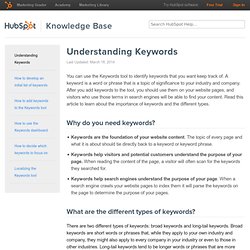
A keyword is a word or phrase that is a topic of significance to your industry and company. After you add keywords to the tool, you should use them on your website pages, and visitors who use those terms in search engines will be able to find your content. Read this article to learn about the importance of keywords and the different types. Why do you need keywords? Keywords are the foundation of your website content. What are the different types of keywords?